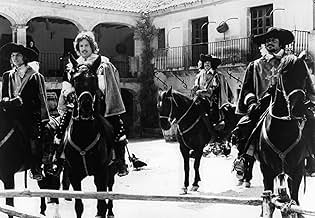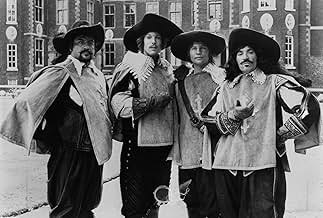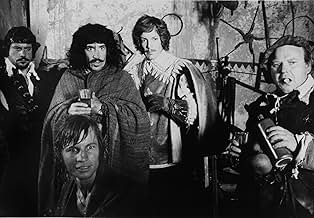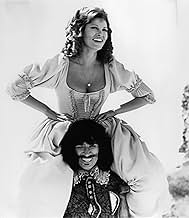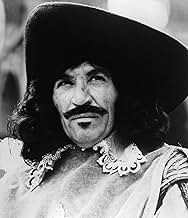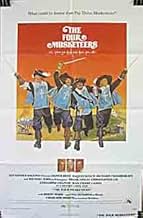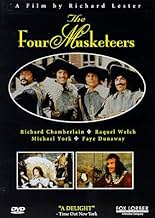VALUTAZIONE IMDb
6,9/10
12.369
LA TUA VALUTAZIONE
I quattro moschettieri difendono la regina e la sua sarta dal cardinale Richelieu e da Milady de Winter.I quattro moschettieri difendono la regina e la sua sarta dal cardinale Richelieu e da Milady de Winter.I quattro moschettieri difendono la regina e la sua sarta dal cardinale Richelieu e da Milady de Winter.
- Regia
- Sceneggiatura
- Star
- Candidato a 1 Oscar
- 1 vittoria e 2 candidature totali
Jean-Pierre Cassel
- Louis XIII
- (as Jean Pierre Cassel)
Ángel del Pozo
- Jussac
- (as Angel Del Pozo)
Recensioni in evidenza
10vox-sane
Don't watch this movie alone. That is, watch Richard Lester's "The Three Musketeers" with it. The two are actually the same film, shot simultaneously (in fact, the cast thought they were making one long movie, to the extent that they were *paid* for one movie; they later sued, as well they should have). In fact, one who hasn't seen Lester's "Three Musketeers" might not understand this movie. Videos and DVDs should be released only in a double-box.
Most "Musketeer" movies are travesties loosely based on Dumas. The 1993 version with Chris O'Donnell is a case in point. It uses little more than the names of characters, and it's woefully inadequate.
The script-writer in Lester's "Musketeers" movies was George MacDonald Fraser, author of the "Flashman" series. And Fraser, unlike writers of all other "Musketeer" movies, seems to have read the book. Some of the wildest things in both movies (for instance, Buckingham's shrine to Anne of Austria) are actually from Dumas. The script, rambunctious and silly as sometimes is, is startlingly close to the book.
Rumor has it that Lester envisioned "Musketeers" as a project for the Beatles. If this is true, he's fortunate he lost them. The cast is uniformly wonderful. Oliver Reed, Richard Chamberlain, and Frank Finlay are perfect in their roles (Finlay is particularly marvelous as he, not a large man, is able to portray the huge, blustering Porthos). Michael York is a fun D'artagnan. Faye Dunaway and Christopher Lee are suitably evil. Rachel Welch, the Pamela Anderson of the late '60s, shows a flair for light comedy that was not often utilized (most of her other movies highlight her . . . ahem . . . other talents). Charlton Heston is the anchor at the center of the film as the scheming Richelieu. He doesn't have much screen time, but his presence dominates the movies, as well it should. Lester also has small parts filled with amazing talents, including Spike Milligan and Roy Kinnear. Keep your eye on a genuine Frenchman, Jean-Pierre Cassel, as the king (and, much later, in Lester's "Return of the Musketeers", as Cyrano); he's a delight in every scene.
Lester's locations are fabulous. His France looks lived-in. One gets the sense of a long, medieval period that has decayed by the time of D'artagnan in the early 1600s, and of a struggling monarchy dominated by the Cardinal trying to rebuild it. Even Cardinal Richelieu, who wasn't really evil, comes off as three-dimensional (compare Heston's subtle performance to Tim Curry's bizarre, anti-historical, one-dimensional inquisitor and fool in the 1993 version).
Being "The Three (Four) Musketeers", there are many sword-fights; Lester somehow is not a great action director, but he somehow manages to make each duel unique, and funny. In "The Four Musketeers" he's given us a duel on the ice between York and Lee that's very funny. And the climactic duel in a church is sublime.
In 1989 Lester released "Return of the Musketeers" with the same cast. Fraser's brief script for that movie (about 100 minutes) gives us the gist of "Twenty Years After", and is quite amusing and a good coda for the series (it's a shame Lester didn't get a chance to do "The Man in the Iron Mask" with a G. M. Fraser script and the same cast. The version with Jeremy Irons and John Malkovich will do, though it's darker and less loyal to Dumas).
On the whole, "The Three Musketeers" and "The Four Musketeers" are the best Musketeer movies ever made. They star men and women who were at the top of their profession at the time. The scripts are superb and there's not a wasted moment. Do not accept lesser substitutes.
Most "Musketeer" movies are travesties loosely based on Dumas. The 1993 version with Chris O'Donnell is a case in point. It uses little more than the names of characters, and it's woefully inadequate.
The script-writer in Lester's "Musketeers" movies was George MacDonald Fraser, author of the "Flashman" series. And Fraser, unlike writers of all other "Musketeer" movies, seems to have read the book. Some of the wildest things in both movies (for instance, Buckingham's shrine to Anne of Austria) are actually from Dumas. The script, rambunctious and silly as sometimes is, is startlingly close to the book.
Rumor has it that Lester envisioned "Musketeers" as a project for the Beatles. If this is true, he's fortunate he lost them. The cast is uniformly wonderful. Oliver Reed, Richard Chamberlain, and Frank Finlay are perfect in their roles (Finlay is particularly marvelous as he, not a large man, is able to portray the huge, blustering Porthos). Michael York is a fun D'artagnan. Faye Dunaway and Christopher Lee are suitably evil. Rachel Welch, the Pamela Anderson of the late '60s, shows a flair for light comedy that was not often utilized (most of her other movies highlight her . . . ahem . . . other talents). Charlton Heston is the anchor at the center of the film as the scheming Richelieu. He doesn't have much screen time, but his presence dominates the movies, as well it should. Lester also has small parts filled with amazing talents, including Spike Milligan and Roy Kinnear. Keep your eye on a genuine Frenchman, Jean-Pierre Cassel, as the king (and, much later, in Lester's "Return of the Musketeers", as Cyrano); he's a delight in every scene.
Lester's locations are fabulous. His France looks lived-in. One gets the sense of a long, medieval period that has decayed by the time of D'artagnan in the early 1600s, and of a struggling monarchy dominated by the Cardinal trying to rebuild it. Even Cardinal Richelieu, who wasn't really evil, comes off as three-dimensional (compare Heston's subtle performance to Tim Curry's bizarre, anti-historical, one-dimensional inquisitor and fool in the 1993 version).
Being "The Three (Four) Musketeers", there are many sword-fights; Lester somehow is not a great action director, but he somehow manages to make each duel unique, and funny. In "The Four Musketeers" he's given us a duel on the ice between York and Lee that's very funny. And the climactic duel in a church is sublime.
In 1989 Lester released "Return of the Musketeers" with the same cast. Fraser's brief script for that movie (about 100 minutes) gives us the gist of "Twenty Years After", and is quite amusing and a good coda for the series (it's a shame Lester didn't get a chance to do "The Man in the Iron Mask" with a G. M. Fraser script and the same cast. The version with Jeremy Irons and John Malkovich will do, though it's darker and less loyal to Dumas).
On the whole, "The Three Musketeers" and "The Four Musketeers" are the best Musketeer movies ever made. They star men and women who were at the top of their profession at the time. The scripts are superb and there's not a wasted moment. Do not accept lesser substitutes.
I was forced to wait 6 months between watching "The Three Musketeers" and getting an opportunity to watch this "sequel" (shot at the same time) and it was agony, though I was somewhat afraid that the second one would not live up to its predecessor. I am glad to say that I was completely wrong and that this one more than lives up to its companion. The action is just as fast and the characters as endearing (because, as we learn, only Porthos could find "a new way to disarm himself" - and then make it work when it counted!) But comedy aside (such as our heroes eating breakfast in the middle of a battle), the serious turns that had to be taken in order to stay true to Dumas' novel were very well done also. Oliver Reed imparts his loathing for Milady DeWinter not only with his words, but also with the expression in his [gorgeous] eyes and when he holds her at gunpoint in order to get the Cardinal's warrant, several seconds go by in which you as a viewer actually believe that he will kill her right there in cold blood. In fact, Reed is, in my opinion, truly the star of this picture as his character of Athos attempts to mentor young D'Artangan and prevent him from being hurt. Michael York is, as usual, wide-eyed and very courageous and Finlay and Chamberlain continue to be terrific fops but it is Reed that carries them through. Kudos also have to go to Faye Dunaway as Milady - she is truly evil and charming at the same time and you can see how her character manages to be so good at what she does. I encourage everyone to see this movie - especially as a companion to "The Three Musketeer" - and support those in favor of having an edited-together three hour version. It is truly a classic. (And side note to my fellow students - if you don't have time to read the book "The Three Musketeers," rent these two movies and you'll get the gist of what you need to know.)
Continues pretty much immediately from where 'The Three Musketeers' left things. This focuses on the need of milady - nasty Faye Dunaway - to get revenge on D'Artagnan (Michael York) and girlfriend Constance (Raquel Welch).
Darker than its predecessor and possibly not as much fun, this is still as good as the first film giving the principals more time to concentrate on character rather than the origins elements. This results in wonderful turns from Finlay, Reed and especially Heston and Lee who seem to have more to do and appear to be enjoying themselves immensely.
A bit more of the wonderful Roy Kinnear would have been nice - he seems to have been thrown in front of the camera for the occasional comedy scene and as quickly removed. Overall, great fun though.
A disappointing sequel followed some year later.
Darker than its predecessor and possibly not as much fun, this is still as good as the first film giving the principals more time to concentrate on character rather than the origins elements. This results in wonderful turns from Finlay, Reed and especially Heston and Lee who seem to have more to do and appear to be enjoying themselves immensely.
A bit more of the wonderful Roy Kinnear would have been nice - he seems to have been thrown in front of the camera for the occasional comedy scene and as quickly removed. Overall, great fun though.
A disappointing sequel followed some year later.
Athos, Porthos, Aramis and D'Artagnan are back; or more precisely, are still here; for the second half of the Dumas novel. As I'm sure most fans know, this was meant to be part of the complete Three Musketeers, before the Salkinds split it into two films. This led to much litigation and the creation of the "Salkind clause" in movie contracts.
Spoliers-The film takes up where the first part left off; D'Artagnan and the Musketeers have saved the Queen from embarassment and confounded the evil Cardinal Richelieu. D'Artagnan is now a full fledged Musketeer (although, in the novel, he was still just a guardsman).
Now the Cardinal hatches a new plot to persuade the Duke of Buckingham from joining the protestant Huguenot rebels at the city of La Rochelle. Milady is sent to persuade him to change his mind or kill him. Although Buckingham imprisons her, he underestimates the power of her charms. The Duke meets a tragic end and Milady returns to France to seek her revenge on D'Artagnan.
Meanwhile, D'Artagnan rescues his mistress Constance and places her in safekeeping. He learns the true identity of Milady and the mystery behind Athos' melancholy.
The Musketeers are sent to fight at La Rochelle and uncover the Cardinal's plot to kill Buckingham. Although the other Musketeers care little, D'Artagnan owes a debt to Buckingham and tries to stop the plot.
D'Artagnan pays a terrible price for his efforts, but emerges as a lieutenant of the Musketeers. He has taken his place as the leader of the group, but will find little solace in his promotion.
As with the first film, the performances are spot on. Everything is the same, as it was filmed at the same time. It is best viewed as a whole with the Three Musketeers.
Spoliers-The film takes up where the first part left off; D'Artagnan and the Musketeers have saved the Queen from embarassment and confounded the evil Cardinal Richelieu. D'Artagnan is now a full fledged Musketeer (although, in the novel, he was still just a guardsman).
Now the Cardinal hatches a new plot to persuade the Duke of Buckingham from joining the protestant Huguenot rebels at the city of La Rochelle. Milady is sent to persuade him to change his mind or kill him. Although Buckingham imprisons her, he underestimates the power of her charms. The Duke meets a tragic end and Milady returns to France to seek her revenge on D'Artagnan.
Meanwhile, D'Artagnan rescues his mistress Constance and places her in safekeeping. He learns the true identity of Milady and the mystery behind Athos' melancholy.
The Musketeers are sent to fight at La Rochelle and uncover the Cardinal's plot to kill Buckingham. Although the other Musketeers care little, D'Artagnan owes a debt to Buckingham and tries to stop the plot.
D'Artagnan pays a terrible price for his efforts, but emerges as a lieutenant of the Musketeers. He has taken his place as the leader of the group, but will find little solace in his promotion.
As with the first film, the performances are spot on. Everything is the same, as it was filmed at the same time. It is best viewed as a whole with the Three Musketeers.
Raquel Welch, Richard Chamberlain, Michael York, Geraldine Chaplin, Faye Dunaway, Charlton Heston, boy oh boy what a shining list of major stars of the 70's. The movie attracts my attention first because of the most-read French story, second the cast is absolutely another one. The chivalry tale is always the love of the directors and we have about 20 productions bearing the same name within the short movie history. The Spanish setting e.g. the fight in the old church is marvellous, I guess filming in Spain at that time didn't cost too much. Just look at the scheming and wicked black female spider Faye Dunaway is already a pure and high entertainment, and Michael York then looked really innocent and like loverboy.
Lo sapevi?
- QuizCardinal Richelieu (Charlton Heston) says to d'Artagnan (Michael York) that he has no personal enemies, only enemies of France. This line is in neither the original novel nor the script. Charlton Heston came across this quote of the Cardinal's when researching the role, and asked director Richard Lester to find a place to include it in this movie.
- BlooperThe English troops being reviewed by Buckingham are carrying Union Flags. Although that flag did exist at this date, it was not used by the Army until the Act of Union (which brought England and Scotland together as one State) roughly seventy years later - they should still have been carrying flags bearing only the Cross of St George.
- Citazioni
Porthos: You know, it strikes me that we would be better employed wringing Milady's pretty neck than shooting these poor devils of Protestants. I mean, what are we killing them for? Because they sing psalms in French and we sing them in Latin?
Aramis: Porthos, have you no education? What do you think religious wars are all about?
- Versioni alternativeThere exists at least two versions of the ending to this film. The rather curious difference is that in one the narration is spoken by Richard Chamberlain, in the other it is done by Frank Finlay!
- ConnessioniEdited from I tre moschettieri (1973)
I più visti
Accedi per valutare e creare un elenco di titoli salvati per ottenere consigli personalizzati
- How long is The Four Musketeers: Milady's Revenge?Powered by Alexa
Dettagli
- Data di uscita
- Paesi di origine
- Sito ufficiale
- Lingua
- Celebre anche come
- The Four Musketeers
- Luoghi delle riprese
- Toledo, Castilla-La Mancha, Spagna('Cardinal de Richelieu sedan chair arrival')
- Aziende produttrici
- Vedi altri crediti dell’azienda su IMDbPro
Botteghino
- Lordo Stati Uniti e Canada
- 19.096.800 USD
Contribuisci a questa pagina
Suggerisci una modifica o aggiungi i contenuti mancanti



